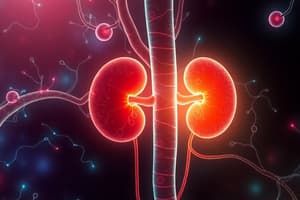Podcast
Questions and Answers
Which symptom would indicate that a client has developed a complication after undergoing cystoscopy?
Which symptom would indicate that a client has developed a complication after undergoing cystoscopy?
- Dizziness (correct)
- Bladder spasms
- Pink-tinged urine
- Chills
Where is prompt management of renal calculi most critical due to a high propensity for obstruction?
Where is prompt management of renal calculi most critical due to a high propensity for obstruction?
- In the ureteral segment near the sacroiliac junction
- In the ureterovesical junction
- In the urethra
- In the ureteropelvic junction (correct)
In which situation is renal replacement therapy indicated for a patient with declining renal function?
In which situation is renal replacement therapy indicated for a patient with declining renal function?
- When the patient's creatinine level drops below 1.2 mg/dL
- When approximately 40% of nephrons are not functioning
- When about 80% of the nephrons are no longer functioning (correct)
- When the patient's blood urea nitrogen (BUN) is above 15 mg/dL
What would be considered a priority outcome for a client experiencing severe flank pain due to renal calculi?
What would be considered a priority outcome for a client experiencing severe flank pain due to renal calculi?
What preparation is necessary for a client scheduled to have a KUB radiograph?
What preparation is necessary for a client scheduled to have a KUB radiograph?
Which measure is most important for the nurse to include in pretest preparation for an intravenous pyelogram (IVP)?
Which measure is most important for the nurse to include in pretest preparation for an intravenous pyelogram (IVP)?
What might be a misleading assumption about the location of renal calculi regarding urgency of management?
What might be a misleading assumption about the location of renal calculi regarding urgency of management?
What is a common misconception regarding renal function decline and the need for dialysis?
What is a common misconception regarding renal function decline and the need for dialysis?
Which statement reflects an inadequate understanding of the diuretic phase of kidney injury?
Which statement reflects an inadequate understanding of the diuretic phase of kidney injury?
If a client with chronic kidney disease states which medication is needed to enhance red blood cell production, further teaching is required?
If a client with chronic kidney disease states which medication is needed to enhance red blood cell production, further teaching is required?
What type of samples should the nurse collect for a creatinine clearance measurement?
What type of samples should the nurse collect for a creatinine clearance measurement?
Which manifestation should a nurse assess for in a client diagnosed with acute pyelonephritis?
Which manifestation should a nurse assess for in a client diagnosed with acute pyelonephritis?
What should the nurse investigate regarding a client presenting with low abdominal pain and hematuria?
What should the nurse investigate regarding a client presenting with low abdominal pain and hematuria?
When administering Epoetin alfa (Epogen), which adverse effect should the nurse monitor for?
When administering Epoetin alfa (Epogen), which adverse effect should the nurse monitor for?
What clinical manifestations should a nurse assess in a hemodialysis client with a left arm fistula at risk for steal syndrome?
What clinical manifestations should a nurse assess in a hemodialysis client with a left arm fistula at risk for steal syndrome?
Which of the following is an indication for further assessment when a client presents with unexplained hematuria?
Which of the following is an indication for further assessment when a client presents with unexplained hematuria?
Flashcards are hidden until you start studying
Study Notes
Cystoscopy Complications
- Pink-tinged urine, dizziness, chills, and bladder spasms can all be post-cystoscopy complications
Renal Replacement Therapy
- Renal replacement therapy (dialysis) is indicated when roughly 80% of nephrons are no longer functioning
Renal Calculi Location
- Prompt management of renal calculi is most important when they are located in the ureteropelvic junction
Acute Kidney Injury (AKI)
- The diuretic phase of AKI is characterized by increased urine output, indicating some return of renal function
- BUN and serum creatinine levels will typically rise in the initial days of diuresis
Hemodialysis: Steal Syndrome
- Steal syndrome, which can occur in hemodialysis patients with a left arm fistula, is characterized by pallor, diminished pulse, and pain in the left hand
- This occurs due to the fistula stealing blood from the hand
Hemodialysis: Fistula Care
- A hemodialysis client with a left arm fistula may experience steal syndrome – this presents as pallor, diminished pulse, and pain in the left hand
Chronic Kidney Disease (CKD)
- CKD is treated with medications to enhance red blood cell production, such as Epogen (Procrit)
- Epoetin alfa (Epogen), a medication used for CKD, can cause hypertension as an adverse effect
- Iron intoxication is not a common adverse effect of Epogen
Pyelonephritis
- Chills and nausea are manifestations of acute pyelonephritis.
Hematuria and Abdominal Pain
- Hematuria and low abdominal pain, without fever, can indicate trauma to the bladder or abdomen.
Intravenous Pyelogram (IVP)
- A client scheduled for an IVP should have their iodine allergy checked.
Kidney, Ureter, and Bladder (KUB) Radiograph
- No special preparation is required for a KUB radiograph.
Studying That Suits You
Use AI to generate personalized quizzes and flashcards to suit your learning preferences.





